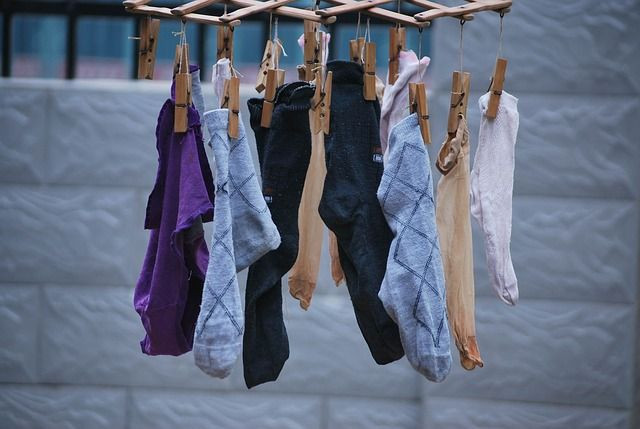Gym Clothes Are Packed With Organic Chemicals That Most Washing Machines Can't Clean

Every article of clothing we wear can only last a certain amount of time before it must return to the washing machine, no matter what the sniff test tells us. According to the American Cleaning Institute, which represents cleaning product manufacturers, bras can be worn two to three times before they have to be washed. Jeans can too. Shirts, socks, and underwear, on the other hand, should be washed after every wear to cut down on bacteria.
But washing doesn’t get everything out. Researchers from Northumbria University in England have finished a study analyzing different molecules on our clothes that cause them to stink. They identified a total of six volatile organic compounds (VOCs) that make our dirty laundry smell bad, and some of them aren’t washed out during a regular cycle. VOCs are the byproducts of bacteria on our skin, such as Corynebacterium and some Staphylococcus species, that come into contact with the initially odorless sweat from our underarm.
"The need to conserve the environment by reducing the wash temperature and the use of biodegradable washing products have grown in importance in the new millennium, making this type of research more high profile," said Professor John Dean, corresponding author of the study, in a statement.
Dean and his colleagues recruited six men and two women for their study. After washing their feet with tap water and drying them, each participant was asked to wear a new pair of socks for at least 10 hours in a specific type of shoe. Each sock was placed in separate bags, which were stored in a dark room overnight. For the second part of the study, nine men were asked to wear a new shirt for a two- to three-hour, five-a-side soccer tournament. The shirts were bagged separately and refrigerated immediately following the tournament.
The research team washed the shirts and socks in a lab machine made up of several smaller washing machines, called the Tergometer, at 68 degrees with non-perfumed detergent. It then took samples of VOCs while the clothes were still wet and after they had dried. These samples revealed evidence of six different types of VOCs with a variety of odors. Overall, the shirts and socks came out smelling a lot better than they did when they went in.
"The work is fascinating as it links an everyday event — the washing of clothes — with cutting-edge research," said Dean. "In this particular research project we applied a new and innovative analytical technique for the detection of volatile compounds found in laundry items. We hope this provides a way of analyzing the effectiveness of different washing techniques."
Refusing to wash any type of laundry, whether it be gym clothes, everyday clothes, sleepwear, or bed sheets, can impact health in a number of ways. Investigators from the memory-foam mattress company Ergoflex conducted a survey that gauged each respondent’s bedtime hygiene habits. People who did not wash their pajamas or bedsheets for more than a week were at a significantly higher risk for skin infections, drug-resistant Staph infections, and urinary tract infections.
Those are some pretty alarming results considering many single men don’t see the need to wash their bed sheets more than four times a year.
Source: Denawaka C, Fowlis I, Dean J. Source, Impact and Removal of Malodour from Soiled Clothing. Journal of Chromatography A. 2016.



























